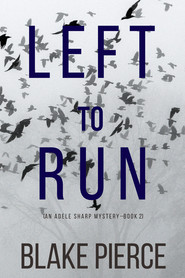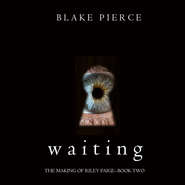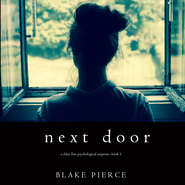По всем вопросам обращайтесь на: info@litportal.ru
(©) 2003-2024.
✖
Left To Die
Настройки чтения
Размер шрифта
Высота строк
Поля
She stared at the houses at the end of the cul-de-sac, her hands jammed in her pockets for warmth as she surveyed the yards. Her dad’s house wasn’t large, but it was just a bit larger than the other houses on the block. It wasn’t particularly clean, but it was just a fraction cleaner than the other homes. He did have a white picket fence—the remnants of the American dream.
Her father had been born in the US, and had been deployed to Germany with the army. He’d stayed in Germany for Adele’s mother at first. He didn’t have any family back stateside. Part of Adele had often thought her father had fled something back home. He’d never returned to the US, not even on vacation after leaving the military and gaining his German citizenship. Now, very little of his American loyalty remained. Still, he couldn’t resist showing up his German neighbors.
Even the grass, in the lawn, though it may have just been Adele’s imagination, was a half inch taller after trimming than the other houses on the cul-de-sac. Her father did the yard work himself and painted the house himself. He didn’t believe in hiring people to do something he could do. Of course, after eight hours on a job, coming home only to pick up more projects had left little room for time with the wife and kid once upon a time.
Adele twisted at her sleeves and stalked up the sidewalk, passing a fire hydrant and nodding toward someone peering at her through the window of a neighbor’s home. She sighed in nervous little puffs of breath. She hadn’t necessarily wanted to visit her father. It had been a few years since she’d actually seen him in person.
But if he found out from his law enforcement buddies that she’d been in Germany and hadn’t visited him, she’d never hear the end of it.
“The ever doting father,” Adele murmured to herself, jamming her hands back into her pockets as she strode toward the two-story, stone veneer house at the end of the block.
She could hear the neighbor’s dogs yelping and barking, and vaguely thought of a childhood without pets. Her father hadn’t wanted to clean up after them. Adele had gotten the turtle with Angus more out of spite than any actual desire to own the poor creature.
Already, bitter thoughts circled her head, and Adele felt like she was back to being twelve all over again.
She strode up the sidewalk, took the patio steps, and knocked politely on the front door.
The Sergeant hated it when people rang the bell. There were a lot of things that annoyed her father, and Adele had a memorized list. Walking on eggshells around Joseph Sharp wasn’t only a necessity, it was a practiced skill. And of everyone Adele knew, she’d practiced best.
Still, though, she wasn’t looking forward to the visit. She knocked again, politely, and heard a voice call from inside, in German, “I’m coming—hold on!”
Adele waited, and the door clicked as locks shifted and bolts rattled as chains were removed.
Her father was safety conscious. He didn’t trust security cameras, but he had more locks on the windows and doors than most banks. And the collection of firearms permitted to him, thanks to his job, also served to provide him peace of mind.
The door swung open, revealing a bald man with an enormous mustache. He had a bit of a belly, but the arms of someone who spent a good amount of time in the weight room.
He had no tattoos, nor any sort of piercing. He was wearing a T-shirt with a stain down the front, and the smell of soup wafted in from the kitchen, gusting past him.
“Hey, Dad,” said Adele, fidgeting and smiling nervously. She also spoke in German. Her father had been born in the States, but he’d lived in Germany now for most his life. She wasn’t sure why, but he hated it when she tried to speak to him in English or French. Secretly, she suspected it reminded him of her mother.
Christ, she was thirty-two. Why was she acting like a ten-year-old all of a sudden? The Sergeant studied her, his bristling mustache twitching more than his lips. If she’d expected a smile in return, she’d been sorely mistaken.
It took her father all of two seconds to recover his wits, and then he nodded at her in turn. “Sharp,” he said.
Her father had referred to her by their last name since she was five. At one point, she’d thought he’d done it to infuriate her mother, but after his ex-wife had died, Joseph had continued calling her by her last name. She supposed it was an old habit from police buddies; he’d always wanted a boy after all.
“It’s good to see you,” she said, still smiling. “I brought a gift.” She reached into her jacket pocket and pulled out the can of condensed cream of broccoli she had picked up from the store on the way.
Her father’s eyebrows shifted, and he reached out and took the soup from her, then turned and entered the house again. “Welcome,” he called as an afterthought. “Come in if you want.”
Her father liked soup. Especially if it came in a can. He’d been preparing for the Third World War for the last forty years, and he had turned the basement into a bunker.
“I just thought I’d stop by,” said Adele calling into the house, still standing on the porch in front of the open door.
“Shut the door or you’ll let the cold in!” he called back.
For a moment, the idea of turning and marching back down the patio steps and leaving her father was all too appealing, but Adele thought better of it, and with a quiet breath, she stepped into the house and closed the door behind her. She made sure to do it gently as her father had a pet peeve about slamming doors. She also followed her father into the kitchen, through the living room. Habitually, she flicked off the light near the entrance. A house rule: the last person to leave a room had to turn the lights off to conserve electricity.
Christ, she felt ten all over again.
Adele glanced back, half searching the ground for where she’d left her spine, but also checking to make sure she hadn’t tracked any mud in the house.
She took her shoes off at the door to the kitchen and stepped onto the cold tiled floor with her socks.
“Hungry?” her father asked, leaning over a pot and stirring it with a wooden spoon. He peered into the metal container as tendrils of steam drifted up toward him, and his left hand finagled with the heat knob on the stove.
“Not really,” said Adele.
Her father glanced back at her. “You should eat. You look horrible. Have you been sleeping?”
Adele sighed. “No, not much. I’m on a case.”
“Can’t solve the case if you can’t sleep. You should know that.”
Adele massaged the bridge of her nose and wearily collapsed in a seat at the kitchen table, leaning back, then quickly remembering how much her dad hated it when people rocked in his chairs; she leaned forward again, sitting upright, with her forearms on the table, but her elbows just off.
It was like a soldier rehearsing drills they’d learned when they first entered boot camp.
Her drill sergeant was still making soup.
“It’s clam chowder,” her father said, continuing in German. “Your favorite, right?”
Adele gave a half shrug. “I don’t really like soup.”
Her father made a clicking sound and poured a bowl, and then another.
“Soup is good for you. Comes in all sorts of flavors, and doesn’t have many calories. Do you know what calories are? I was just reading about them the other day.”
“I know what calories are, Dad,” said Adele.
Joseph Sharp nodded at this and came over carrying the soup. He placed the bowl in front of Adele, and then placed another one on a tray on the table.
“Careful, it’s hot. Don’t eat it yet.”
“I get it, Dad, why does everything you say have to sound like an order?”
He glanced at her, frowning slightly, and then reached up stroking at the edge of his mustache. “Just saying don’t burn yourself.”
Adele sighed once more and nodded again.
Coming here had been a mistake. Same old dad. Same old house.
He’d lived here for nearly thirty years.
She remembered growing up in this house. And, unsurprisingly, it was as clean and neat as she remembered. Her father took the tray with his soup and left the kitchen, strolling over to an old reclining chair facing a TV. He sat in the chair and set the tray on a coffee table.
Adele sat at the kitchen table, watching as her father ignored her and began sipping at his soup, staring at the TV, his profile outlined against a window at his side.
Her father had been born in the US, and had been deployed to Germany with the army. He’d stayed in Germany for Adele’s mother at first. He didn’t have any family back stateside. Part of Adele had often thought her father had fled something back home. He’d never returned to the US, not even on vacation after leaving the military and gaining his German citizenship. Now, very little of his American loyalty remained. Still, he couldn’t resist showing up his German neighbors.
Even the grass, in the lawn, though it may have just been Adele’s imagination, was a half inch taller after trimming than the other houses on the cul-de-sac. Her father did the yard work himself and painted the house himself. He didn’t believe in hiring people to do something he could do. Of course, after eight hours on a job, coming home only to pick up more projects had left little room for time with the wife and kid once upon a time.
Adele twisted at her sleeves and stalked up the sidewalk, passing a fire hydrant and nodding toward someone peering at her through the window of a neighbor’s home. She sighed in nervous little puffs of breath. She hadn’t necessarily wanted to visit her father. It had been a few years since she’d actually seen him in person.
But if he found out from his law enforcement buddies that she’d been in Germany and hadn’t visited him, she’d never hear the end of it.
“The ever doting father,” Adele murmured to herself, jamming her hands back into her pockets as she strode toward the two-story, stone veneer house at the end of the block.
She could hear the neighbor’s dogs yelping and barking, and vaguely thought of a childhood without pets. Her father hadn’t wanted to clean up after them. Adele had gotten the turtle with Angus more out of spite than any actual desire to own the poor creature.
Already, bitter thoughts circled her head, and Adele felt like she was back to being twelve all over again.
She strode up the sidewalk, took the patio steps, and knocked politely on the front door.
The Sergeant hated it when people rang the bell. There were a lot of things that annoyed her father, and Adele had a memorized list. Walking on eggshells around Joseph Sharp wasn’t only a necessity, it was a practiced skill. And of everyone Adele knew, she’d practiced best.
Still, though, she wasn’t looking forward to the visit. She knocked again, politely, and heard a voice call from inside, in German, “I’m coming—hold on!”
Adele waited, and the door clicked as locks shifted and bolts rattled as chains were removed.
Her father was safety conscious. He didn’t trust security cameras, but he had more locks on the windows and doors than most banks. And the collection of firearms permitted to him, thanks to his job, also served to provide him peace of mind.
The door swung open, revealing a bald man with an enormous mustache. He had a bit of a belly, but the arms of someone who spent a good amount of time in the weight room.
He had no tattoos, nor any sort of piercing. He was wearing a T-shirt with a stain down the front, and the smell of soup wafted in from the kitchen, gusting past him.
“Hey, Dad,” said Adele, fidgeting and smiling nervously. She also spoke in German. Her father had been born in the States, but he’d lived in Germany now for most his life. She wasn’t sure why, but he hated it when she tried to speak to him in English or French. Secretly, she suspected it reminded him of her mother.
Christ, she was thirty-two. Why was she acting like a ten-year-old all of a sudden? The Sergeant studied her, his bristling mustache twitching more than his lips. If she’d expected a smile in return, she’d been sorely mistaken.
It took her father all of two seconds to recover his wits, and then he nodded at her in turn. “Sharp,” he said.
Her father had referred to her by their last name since she was five. At one point, she’d thought he’d done it to infuriate her mother, but after his ex-wife had died, Joseph had continued calling her by her last name. She supposed it was an old habit from police buddies; he’d always wanted a boy after all.
“It’s good to see you,” she said, still smiling. “I brought a gift.” She reached into her jacket pocket and pulled out the can of condensed cream of broccoli she had picked up from the store on the way.
Her father’s eyebrows shifted, and he reached out and took the soup from her, then turned and entered the house again. “Welcome,” he called as an afterthought. “Come in if you want.”
Her father liked soup. Especially if it came in a can. He’d been preparing for the Third World War for the last forty years, and he had turned the basement into a bunker.
“I just thought I’d stop by,” said Adele calling into the house, still standing on the porch in front of the open door.
“Shut the door or you’ll let the cold in!” he called back.
For a moment, the idea of turning and marching back down the patio steps and leaving her father was all too appealing, but Adele thought better of it, and with a quiet breath, she stepped into the house and closed the door behind her. She made sure to do it gently as her father had a pet peeve about slamming doors. She also followed her father into the kitchen, through the living room. Habitually, she flicked off the light near the entrance. A house rule: the last person to leave a room had to turn the lights off to conserve electricity.
Christ, she felt ten all over again.
Adele glanced back, half searching the ground for where she’d left her spine, but also checking to make sure she hadn’t tracked any mud in the house.
She took her shoes off at the door to the kitchen and stepped onto the cold tiled floor with her socks.
“Hungry?” her father asked, leaning over a pot and stirring it with a wooden spoon. He peered into the metal container as tendrils of steam drifted up toward him, and his left hand finagled with the heat knob on the stove.
“Not really,” said Adele.
Her father glanced back at her. “You should eat. You look horrible. Have you been sleeping?”
Adele sighed. “No, not much. I’m on a case.”
“Can’t solve the case if you can’t sleep. You should know that.”
Adele massaged the bridge of her nose and wearily collapsed in a seat at the kitchen table, leaning back, then quickly remembering how much her dad hated it when people rocked in his chairs; she leaned forward again, sitting upright, with her forearms on the table, but her elbows just off.
It was like a soldier rehearsing drills they’d learned when they first entered boot camp.
Her drill sergeant was still making soup.
“It’s clam chowder,” her father said, continuing in German. “Your favorite, right?”
Adele gave a half shrug. “I don’t really like soup.”
Her father made a clicking sound and poured a bowl, and then another.
“Soup is good for you. Comes in all sorts of flavors, and doesn’t have many calories. Do you know what calories are? I was just reading about them the other day.”
“I know what calories are, Dad,” said Adele.
Joseph Sharp nodded at this and came over carrying the soup. He placed the bowl in front of Adele, and then placed another one on a tray on the table.
“Careful, it’s hot. Don’t eat it yet.”
“I get it, Dad, why does everything you say have to sound like an order?”
He glanced at her, frowning slightly, and then reached up stroking at the edge of his mustache. “Just saying don’t burn yourself.”
Adele sighed once more and nodded again.
Coming here had been a mistake. Same old dad. Same old house.
He’d lived here for nearly thirty years.
She remembered growing up in this house. And, unsurprisingly, it was as clean and neat as she remembered. Her father took the tray with his soup and left the kitchen, strolling over to an old reclining chair facing a TV. He sat in the chair and set the tray on a coffee table.
Adele sat at the kitchen table, watching as her father ignored her and began sipping at his soup, staring at the TV, his profile outlined against a window at his side.

















